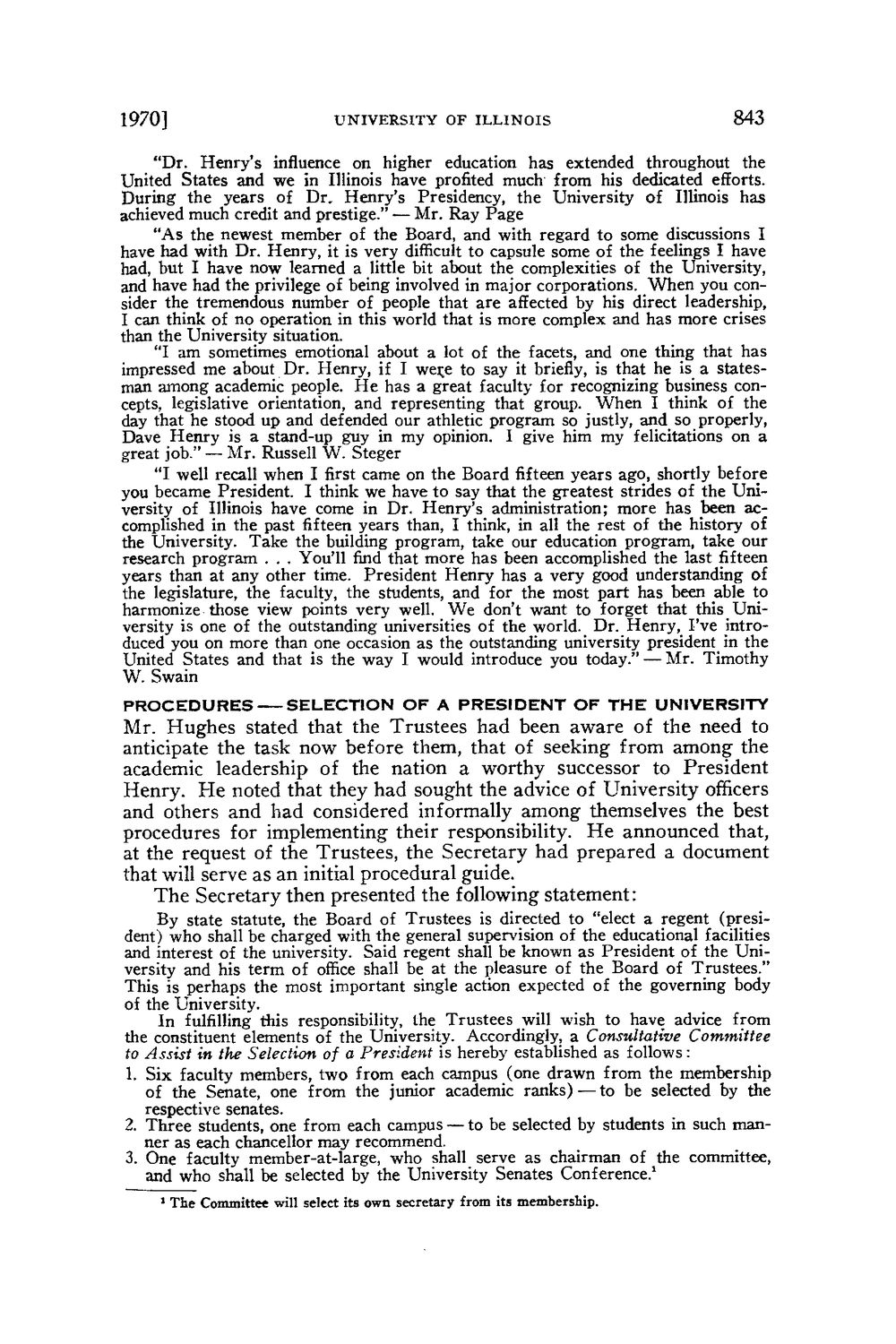| |
| |
Caption: Board of Trustees Minutes - 1970
This is a reduced-resolution page image for fast online browsing.

EXTRACTED TEXT FROM PAGE:
1970] UNIVERSITY OF ILLINOIS 843 "Dr. Henry's influence on higher education has extended throughout the United States and we in Illinois have profited much from his dedicated efforts. During the years of Dr. Henry's Presidency, the University of Illinois has achieved much credit and prestige." — Mr. Ray Page "As the newest member of the Board, and with regard to some discussions I have had with Dr. Henry, it is very difficult to capsule some of the feelings I have had, but I have now learned a little bit about the complexities of the University, and have had the privilege of being involved in major corporations. When you consider the tremendous number of people that are affected by his direct leadership, I can think of no operation in this world that is more complex and has more crises than the University situation. "I am sometimes emotional about a lot of the facets, and one thing that has impressed me about Dr. Henry, if I wer.e to say it briefly, is that he is a statesman among academic people. He has a great faculty for recognizing business concepts, legislative orientation, and representing that group. When I think of the day that he stood up and defended our athletic program so justly, and so properly, Dave Henry is a stand-up guy in my opinion. I give him my felicitations on a great job." — Mr. Russell W. Steger "I well recall when I first came on the Board fifteen years ago, shortly before you became President. I think we have to say that the greatest strides of the University of Illinois have come in Dr. Henry's administration; more has been accomplished in the past fifteen years than, I think, in all the rest of the history of the University. Take the building program, take our education program, take our research program . . . You'll find that more has been accomplished the last fifteen years than at any other time. President Henry has a very good understanding of the legislature, the faculty, the students, and for the most part has been able to harmonize those view points very well. We don't want to forget that this University is one of the outstanding universities of the world. Dr. Henry, I've introduced you on more than one occasion as the outstanding university president in the United States and that is the way I would introduce you today." — Mr. Timothy W. Swain PROCEDURES SELECTION OF A PRESIDENT OF THE UNIVERSITY Mr. H u g h e s stated that the Trustees had been aware of the need to anticipate the task now before them, that of seeking from among the academic leadership of the nation a worthy successor to President Henry. H e noted that they had sought the advice of University officers and others and had considered informally among themselves the best procedures for implementing their responsibility. H e announced that, at the request of the Trustees, the Secretary had prepared a document that will serve as an initial procedural guide. T h e Secretary then presented the following statement: By state statute, the Board of Trustees is directed to "elect a regent (president) who shall be charged with the general supervision of the educational facilities and interest of the university. Said regent shall be known as President of the University and his term of office shall be at the pleasure of the Board of Trustees." This is perhaps the most important single action expected of the governing body of the University. In fulfilling this responsibility, the Trustees will wish to have advice from the constituent elements of the University. Accordingly, a Consultative Committee to Assist in the Selection of a President is hereby established as follows: 1. Six faculty members, two from each campus (one drawn from the membership of the Senate, one from the junior academic ranks) •— to be selected by the respective senates. 2. Three students, one from each campus — to be selected by students in such manner as each chancellor may recommend. 3. One faculty member-at-large, who shall serve as chairman of 1the committee, and who shall be selected by the University Senates Conference. ' The Committee will select its own secretary from its membership.
| |